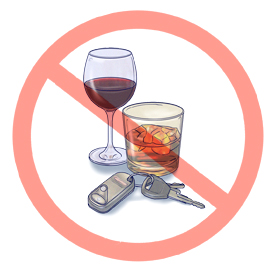Driving Under the Influence (DUI)

Every 39 minutes, someone in the U.S. dies from a vehicle crash because of alcohol. That's about 13,500 deaths per year. About one-third of all traffic deaths are linked to alcohol.
Driving after drinking alcohol or using drugs can be deadly. To safely drive, you need a clear sense of time and speed. You also need to pay attention, think quickly, and react right away. Drugs and alcohol act on the brain. They affect all these functions.
Prevention
You may not know that you are impaired when you are under the influence. This is because of changes in perception and judgment. Have a plan for getting home before you start drinking. Be sure to do one of these:
-
Have someone in your group who won't drink alcohol. This is the designated driver.
-
Use a cab or ride-sharing service.
-
Call a friend or family member.
The effects of alcohol depend mostly on two things: how much and how fast you drink. Other things that affect how long alcohol stays in the body and affects you include:
-
Whether you are a man or woman.
-
Your age.
-
Your weight.
-
Whether you are sick or healthy.
-
What food you have eaten.
-
Any medicines you have taken.
-
Any illicit drugs you have taken along with the alcohol.
-
How often you drink and how used to drinking you are (your tolerance).
Drinking responsibly means knowing how alcohol affects you. Know how much you can drink without putting you or others in danger. You may be legally too drunk to drive even if you don’t feel like it.
Follow-up care
If you or your friends or family think you could have a drug or alcohol problem, then you likely do. These resources can help:
-
Alcoholics Anonymous (AA) at www.aa.org. This group gives support through mutual self-help.
-
Al-Anon at https://al-anon.org/. This group gives support to families and friends of problem drinkers.
-
SMART Recovery at www.smartrecovery.org. Self-Management and Recovery Training (SMART) provides addiction support through online forums or in-person support groups in some communities.
-
Residential alcohol treatment. This type of inpatient program may help. Look online to find a program near you. You can also ask your health care provider for a referral.
Online Medical Reviewer:
Daphne Pierce-Smith RN MSN
Online Medical Reviewer:
Michelle Anderson DNP
Date Last Reviewed:
3/1/2025
© 2000-2025 The StayWell Company, LLC. All rights reserved. This information is not intended as a substitute for professional medical care. Always follow your healthcare professional's instructions.